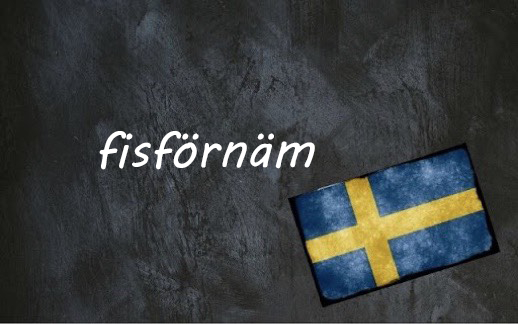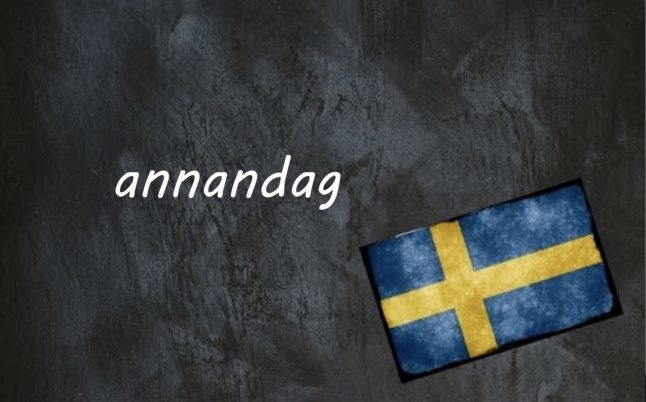Fisförnäm is a composition of the two words fis, meaning ‘fart’, primarily one with a hissing sound, and förnäm, which means ‘noble, distinguished’. The combination is a slight slur for someone who is ‘stuck up, cocky, or thinks themselves better than others’ but who in actuality is not better at all. Perhaps somewhat comparable to the American expression of ’thinking the sun shines out of one’s own arse’ or simply ‘self-important’.
The late linguistics professor Jan Strid once explained fisförnäm on Swedish radio. While doing so he explained that the reason that fis refers to hissing farts is because it most likely has the original meaning of ‘blowing’. Which explains the word askfis, ‘ash fart’, meaning the youngest child which does nothing but sit by the fire blowing into the ashes and getting them all over the face. Then there is the bärfis, the ‘berry fart’, the insect commonly known in English as either shield bug or stink bug. There the word obviously refers to the bad smell produced by the bug.
The late great professor then went on to explain how fisförnäm has a sibling in struntförnäm which means the same thing. Strunt, which in Swedish means ‘nonsense’, comes from German with the original meaning of ‘dung’, ‘dirt’ or ‘filth’. So struntförnäm in a way means ‘filth noble’ and by extension fisförnäm has the same original meaning: someone who says they are great, but they are really not better at all.
And that is a word that in a way is quintessentially Swedish. Why? Because of Jantelagen.
Many of you are surely already familiar with the Law of Jante, but for those of you who are not, Jantelagen, first formalized in a satirical novel by Danish-Norwegian author Aksel Sandemose, is a set of rules or attitudes that many Swedes, Norwegians and Danes supposedly espouse. You might enjoy having a look at celebrated Swedish actor Alexander Skarsgård explaining it on The Late Show with Stephen Colbert.
Fisförnäm has been found in print as far back as 1954, some 21 years after the publication of Sandemose’s book A Fugitive Crosses His Tracks (En flyktning krysser sitt spor), in 1933. So it is younger than the formalization of the Law of Jante, but there is probably no connection between the two besides the societal norms both are expressions of. And though the 10 rules of the so called Law of Jante were first expressed in the aforementioned book, the attitudes are much older.
To think yourself better than others is still somewhat frowned upon in Sweden, even if it is true. If you are familiar with Swedish football history you might have seen this in the Swedish public’s reaction to Zlatan Ibrahimovic’s rise to stardom. Some Swedes just could not stand his boisterous attitude, some still can not. But of course, fisförnäm is not applicable to Zlatan, since he is arguably the best Swedish footballer of all time.
Fisförnäm is an insult, but not a bad one, and might even be used a bit jokingly. You could perhaps try to use it when someone does not want to join an activity that is a bit ridiculous. For reference (and a laugh) you might have a look at when famed Swedish show host Stina Dabrowski asked Margaret Thatcher to do a little skip in place on her show.
Example sentences:
Sluta var så fisförnäm nu, du kan väl va med?
Stop being so self-important, why not join in?
Nä, jag orkar inte följa med dit, de är alla så fisförnäma.
Oh no, I’d rather not go there, they are all so unduly haughty.
Villa, Volvo, Vovve: The Local’s Word Guide to Swedish Life, written by The Local’s journalists, is now available to order. Head to lysforlag.com/vvv to read more about it. It is also possible to buy your copy from Amazon US, Amazon UK, Bokus or Adlibris.



 Please whitelist us to continue reading.
Please whitelist us to continue reading.
Member comments